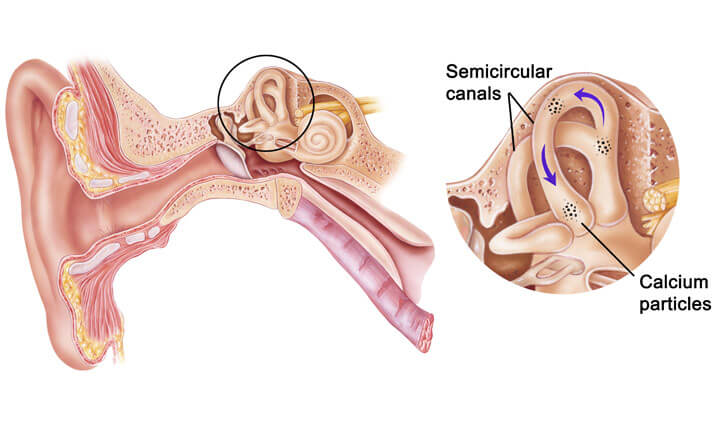Benign paroxysmal positional vertigo (BPPV) is one of the most common causes of sudden and severe vertigo (dizziness) when your head moves around. Common triggers of your vertigo or dizziness include rolling over in bed, getting out of bed, and lifting your head to look up. It’s also the easiest type of vertigo to treat by physiotherapists.
BPPV occurs most often in people aged 50 and older, but can occur at any age, and is more common in women than in men.
Symptoms
The signs and symptoms of BPPV may include:
- Dizziness
- A sense that you or your surroundings are spinning or moving (vertigo)
- A loss of balance or unsteadiness
- Nausea
- Vomiting
Activities that bring about the signs and symptoms of BPPV can vary from person to person, but are almost always brought on by a change in head position. Abnormal rhythmic eye movements often accompany the symptoms of BPPV.

Causes
Inside your ear is a tiny organ called the vestibular labyrinth. It includes three loop-shaped structures (semicircular canals) that contain fluid and fine, hairlike sensors that monitor your head’s rotation.
Other structures (otolith organs) in your ear monitor your head’s movements — up and down, right and left, side to side — and your head’s position related to gravity. These otolith organs contain crystals of calcium that make you sensitive to gravity.
For many reasons, these crystals can become dislodged often moving into one of the semicircular canals — especially while you’re lying down. This causes the semicircular canal to become sensitive to head position changes it would normally not respond to, which is what makes you feel dizzy.
Management of BPPV
Vestibular problems can have a range of different causes, some of which respond extremely well to physiotherapy intervention. An initial assessment, using non-invasive positional tests, would be performed by our physiotherapist to identify the likely cause of the vestibular problem and verify which ear is causing the most symptoms. If the results are inconclusive or the symptoms are more complex you may be referred to your GP for further testing.
Typically, treatment would involve a combination of advice on activity modification and manual treatments to help reset and retrain your vestibular system.
The benefits of physiotherapy treatment to someone with a vestibular condition can be life changing. Not only will you gain a greater understanding of your condition and develop coping strategies, but most people experience an immediate and lasting relief from their symptoms, allowing them to resume normal activities free of limitation.
In fact, we have found the techniques to be quite successful in significantly reducing or eliminating vertigo symptoms in our patients in most cases.
The physiotherapists at Jubilee Sports Physiotherapy have undertaken training to diagnose and successfully treat BPPV.
Contact Us to make an appointment.
Make A Booking
Caringbah Practice
Level 1/191 Taren Point Rd (opposite McDonald’s)
Caringbah, NSW 2229
Call: (02) 9540 9400
Kareela Practice
12 Freya St (opposite Kareela Shopping Village)
Kareela, NSW 2232
Call: (02) 9528 2200
Kogarah Practice
51 President Avenue (diagonally opposite Ilinden Sports Centre)
Kogarah, NSW 2217
Call: (02) 9540 9400
Email us at: office@jubileesportsphysio.com.au






















